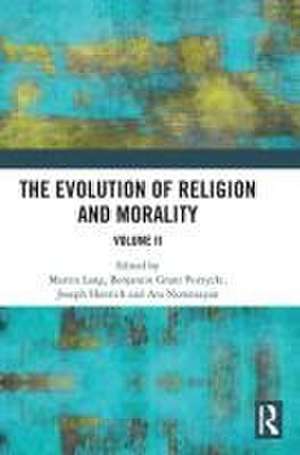The Evolution of Religion and Morality: Volume II
Editat de Martin Lang, Benjamin Grant Purzycki, Joseph Henrich, Ara Norenzayanen Limba Engleză Hardback – 4 dec 2023
The second volume investigates key questions in the evolutionary and cognitive sciences of religion and highlights cultural variability and context specificity of diverse religious systems. Chapters draw on a dataset comprising 2,228 participants from 15 ethnographically diverse societies that stretch from Africa and India through Oceania to South America, and include hunter-gatherers, pastoralists, horticulturalists, subsistence farmers and wage laborers. Four chapters using the full dataset answer the following questions:
- What are the general predictors of commitment to supernatural agents?
- Is there a gender gap in religiosity?
- Does belief in punitive gods facilitates cooperation?
- Are supernatural agents implicitly associated with moral concerns?
The Evolution of Religion and Morality: Volume II will be a key resource for scholars and researchers of religious studies, human evolutionary biology, psychology, anthropology, the cultural evolution of religion and the sociology of religion. This book was originally published as a special issue of Religion, Brain & Behavior.
Preț: 1005.67 lei
Preț vechi: 1226.42 lei
-18% Nou
Puncte Express: 1509
Preț estimativ în valută:
192.43€ • 200.91$ • 159.26£
192.43€ • 200.91$ • 159.26£
Carte tipărită la comandă
Livrare economică 04-18 aprilie
Preluare comenzi: 021 569.72.76
Specificații
ISBN-13: 9781032624075
ISBN-10: 1032624078
Pagini: 254
Dimensiuni: 174 x 246 x 16 mm
Greutate: 0.61 kg
Ediția:1
Editura: Taylor & Francis
Colecția Routledge
Locul publicării:Oxford, United Kingdom
ISBN-10: 1032624078
Pagini: 254
Dimensiuni: 174 x 246 x 16 mm
Greutate: 0.61 kg
Ediția:1
Editura: Taylor & Francis
Colecția Routledge
Locul publicării:Oxford, United Kingdom
Public țintă
Postgraduate, Undergraduate Advanced, and Undergraduate CoreNotă biografică
Martin Lang is Assistant Professor at LEVYNA: Laboratory for the Experimental Research of Religion at Masaryk University, Brno, Czech Republic. His work focuses on the question of whether and how religious beliefs and behaviours facilitate cooperation.
Benjamin Grant Purzycki is Associate Professor at Aarhus University’s Department of the Study of Religion, Denmark. His books include Religion Evolving: Cultural, Cognitive, and Ecological Dynamics (with Richard Sosis, 2022) and The Minds of Gods: New Horizons in the Naturalistic Study of Religion (with Theiss Bendixen, 2023).
Ara Norenzayan is Professor of Psychology at the University of British Columbia, Canada, and Fellow of the Royal Society of Canada. He has published widely on the evolutionary origins of religion, and the psychology of religious diversity in today’s globalized world. He is the author of Big Gods: How Religion Transformed Cooperation and Conflict.
Joseph Henrich is Ruth Moore Professor of Biological Anthropology in the Department of Human Evolutionary Biology at Harvard University, Cambridge, USA. His research deploys evolutionary theory to understand how human psychology gives rise to cultural evolution and how this has shaped our species’ genetic evolution. His most recent book is The WEIRDest People in the World: How the West became psychologically peculiar and particularly prosperous.
Benjamin Grant Purzycki is Associate Professor at Aarhus University’s Department of the Study of Religion, Denmark. His books include Religion Evolving: Cultural, Cognitive, and Ecological Dynamics (with Richard Sosis, 2022) and The Minds of Gods: New Horizons in the Naturalistic Study of Religion (with Theiss Bendixen, 2023).
Ara Norenzayan is Professor of Psychology at the University of British Columbia, Canada, and Fellow of the Royal Society of Canada. He has published widely on the evolutionary origins of religion, and the psychology of religious diversity in today’s globalized world. He is the author of Big Gods: How Religion Transformed Cooperation and Conflict.
Joseph Henrich is Ruth Moore Professor of Biological Anthropology in the Department of Human Evolutionary Biology at Harvard University, Cambridge, USA. His research deploys evolutionary theory to understand how human psychology gives rise to cultural evolution and how this has shaped our species’ genetic evolution. His most recent book is The WEIRDest People in the World: How the West became psychologically peculiar and particularly prosperous.
Cuprins
Introducing a special issue on phase two of the Evolution of Religion and Morality project1. Material insecurity predicts greater commitment to moralistic and less commitment to local deities: a cross-cultural investigation 2. The religiosity gender gap in 14 diverse societies 3. The moralization bias of gods’ minds: a cross-cultural test 4. When god is watching: dictator game results from the Sursurunga of New Ireland, Papua New Guinea 5. Moralistic and local god beliefs and the extent of prosocial preferences on Tanna Island,Vanuatu 6. Moralizing gods, local gods, and complexity in Hindu god concepts: evidence from South India 7. Cigarettes for the dead: effects of sorcery beliefs on parochial prosociality in Mauritius 8. Perceptions of moralizing agents and cooperative behavior in Northeastern Brazil 9. Prosociality and Pentecostalism in the D.R. Congo 10. Do religious and market-based institutions promote cooperation in Hadza hunter-gatherers? 11. The Evolution of Religion and Morality project: reflections and looking ahead 12. Cultural lessons missed and learnt about religion and culture 13. Two questions for the cultural evolutionary science of religion 14. Big comparison 15. Depth vs. breadth: lessons from the Evolution of Religion and Morality project 16. The Evolution of Religion and Morality project: some modest reservations 17. Guiding the evolution of the evolutionary sciences of religion: a discussion
Descriere
The volume draws on a unique dataset from 15 field sites to answer pressing questions about human religiosity. Building upon the first volume, it presents results from the second phase of Evolution of Religion and Morality project.
